A Diamond Dilemma: Elongated Cushion Cut vs. Oval Cut
When you're hunting for the perfect engagement ring, one of the biggest decisions you're going to need to make is diamond shape. And everyone has a favorite. Is it round? Oval? Emerald? Cushion? We love all diamond shapes around here, but if you're new to the diamond shopping game, it can be super confusing trying to decide, especially when shapes look similar like the elongated cushion cut and the oval cut diamond. But not to worry—I’ve got everything you need to know about these two shapes, how they compare, and how to shop for the diamond of your dreams.
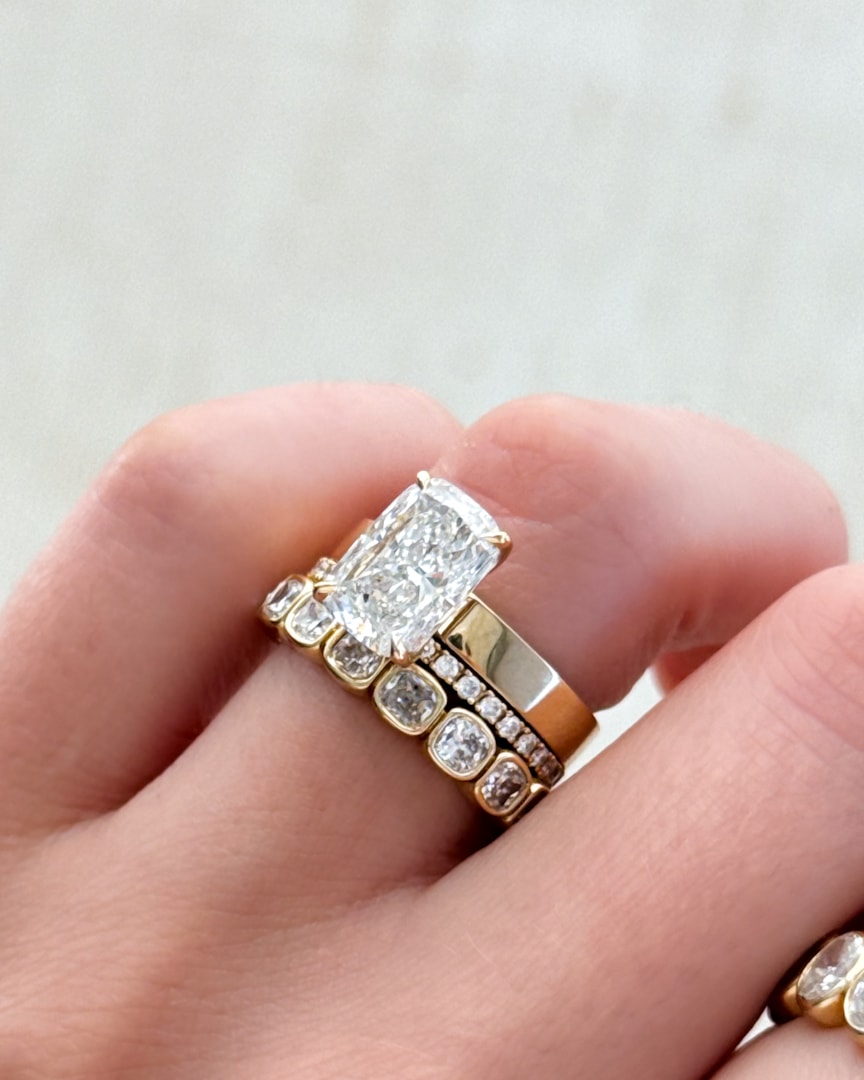
Don’t hesitate to mix and match shapes! Many choose their second favorite shape for their wedding band to add a unique twist.
The Vibes: Elongated Cushion vs. Oval
Alright, let’s start with the basics of these two stunning stone shapes. Both elongated cushion diamonds and oval cut diamonds are absolutely stunning, but they have their own unique vibes.
Elongated Cushion: A classic cushion cut is a rounded square, with curved sides and corners. An elongated cushion is sort of its elegant cousin. It has the same romantic, rounded corners, only with an elongated rectangular shape and gently curved sides that gives it a bit more length. This cut is perfect if you love the vintage look but want something a little different.
Oval: Oval diamonds are, well, ovals. They're like the sophisticated sister of the round brilliant. They have just as much sparkle with a slightly less stuffy shape. They are elongated, just like the cushion, but with a continuous curve all the way around instead of straight sides. Oval cut diamonds are super sparkly, affordable, and have a timeless appeal. Plus, they can make your fingers look longer and more slender. Win-win!
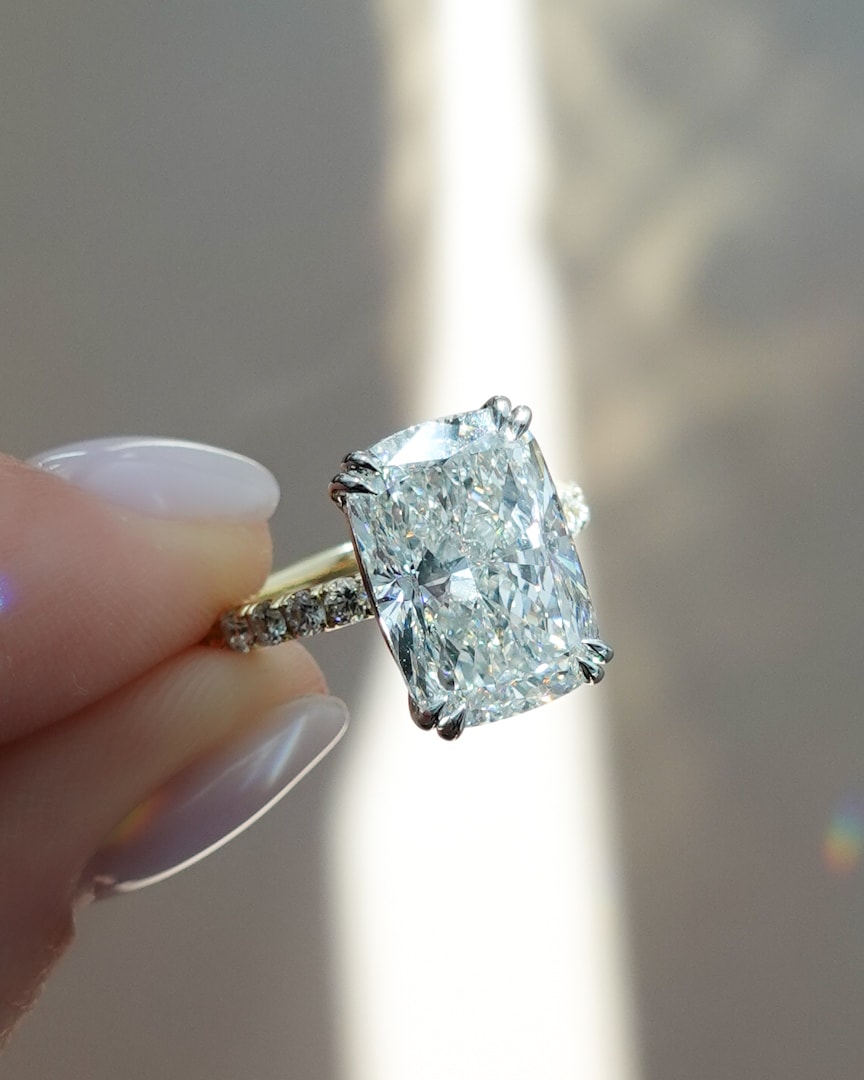
The Signature Pavé Engagement Ring With Elongated Cushion Cut Diamond blends together sophistication and sparkle.
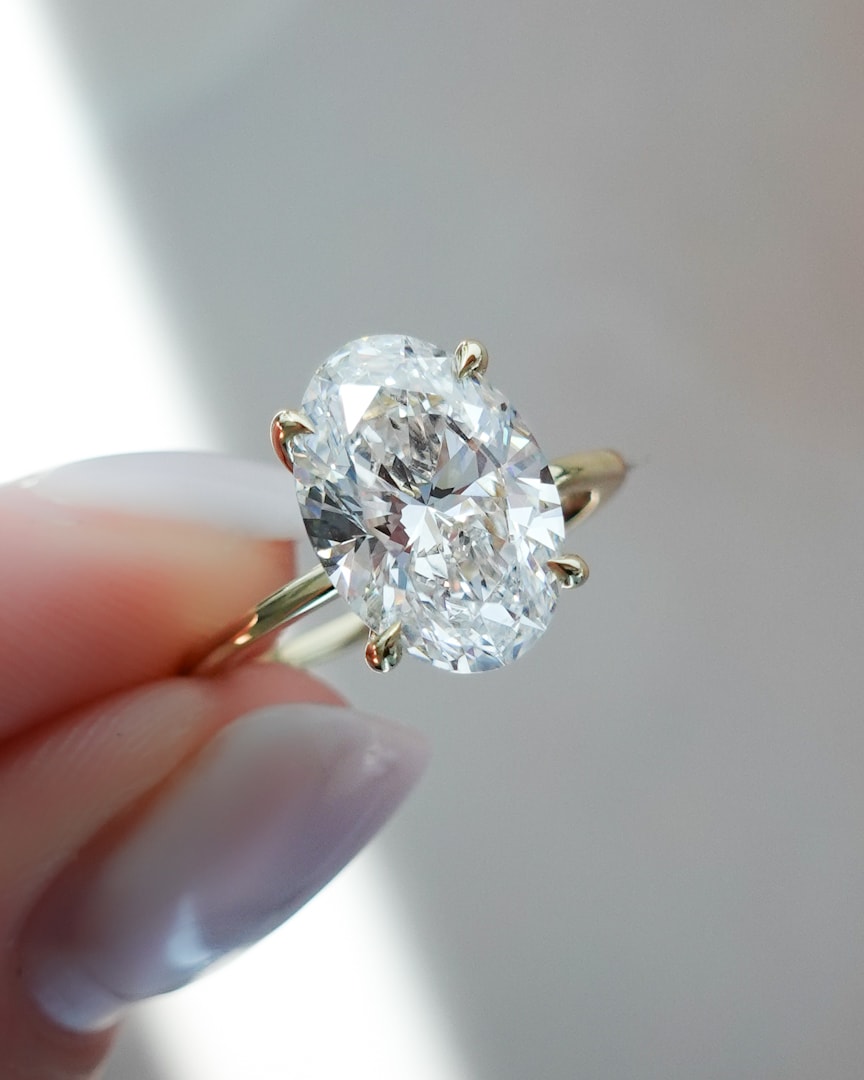
You can never go wrong with the classic, Thin + Simple Solitaire Engagement Ring With Oval Cut Diamond.
Shape and Proportions
When it comes to engagement rings and diamond shape, personal preference reigns supreme, but here are some things to consider:
Elongated Cushion:
The ideal length-to-width ratio for elongated cushion cut diamonds ranges between 1.15 and 1.30, offering a perfect balance of length and width without appearing too stretched or too square, however, personal preference also plays a role in choosing how elongated you prefer your stone shape. Since fancy-shaped diamonds (anything other than a round brilliant) do not have industry-standardized cut grades, you'll want to look for a cushion-cut diamond with excellent symmetry. Each one is unique but the shape should appear even overall, without any lumps and bumps.
In terms of proportions, the depth and table percentages significantly influence the brilliance and fire of an elongated cushion-cut diamond. A depth percentage between 58% and 62% is just right, as this allows for optimal light performance to maximize sparkle. The table percentage should ideally be between 53% and 63%.
Oval:
When it comes to oval cut diamonds' length-to-width ratio, something between 1.30 and 1.40 typically offers a well-balanced, traditional oval shape, while a ratio between 1.41 and 1.50 gives a more elongated and slender look. Ratios above 1.50 result in a distinctly stretched appearance, which might appeal to those seeking a unique look. Again, symmetry is essential, as you want both ends to be evenly rounded, the curve to be smooth without any noticeable flat areas, and the table to be well-centered, all contributing to a balanced, brilliant look.
The ideal depth percentage for oval diamonds ranges from 58% to 62%, ensuring optimal light reflection and sparkle. Meanwhile, a table percentage between 53% and 63% will help your diamond achieve balanced light performance. Additionally, while evaluating an oval diamond, it's crucial to check for the bow-tie effect—a dark area across the center that resembles a bow tie. Although common in oval cuts, a well-cut diamond will minimize this effect, maintaining consistent light and sparkle throughout the stone.
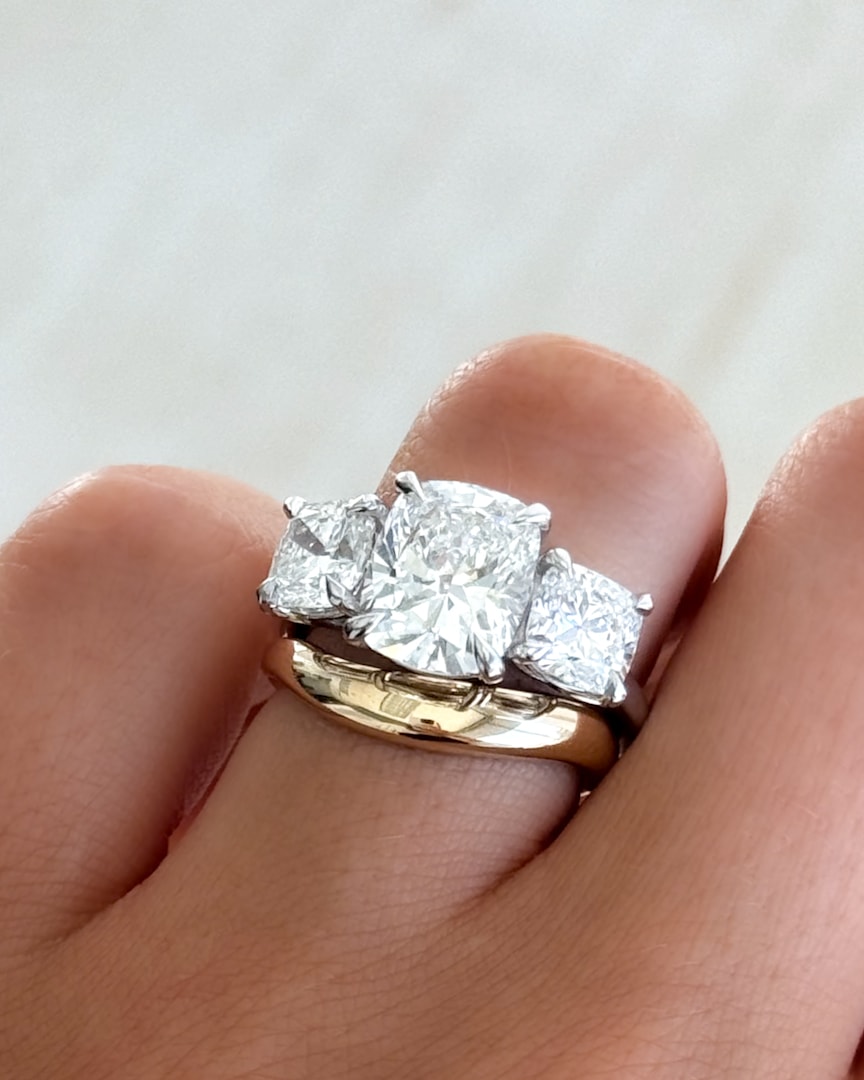
Mixing metals and shape sizes with the, Triad Engagement Ring With Mixed Cushion Cut Diamonds.
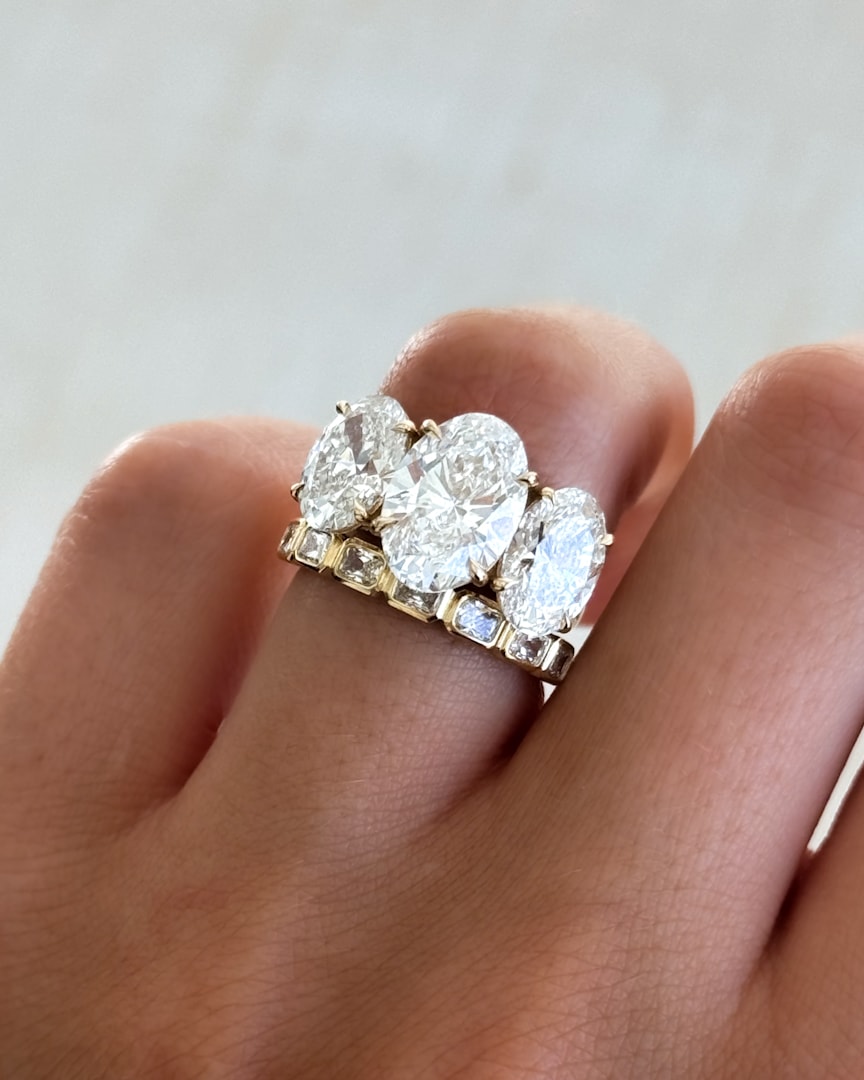
Our beloved, Triad Engagement Ring With Oval Cut Diamonds allows for optimal sparkle and beauty.
Color and Clarity
You luck out here because each of these two diamond shapes can hide inclusions and color pretty well, but there are a few things to keep in mind. Oval-cut diamonds can sometimes show a bit of color near the ends, so if you want a super-white diamond, you might stay at G color or higher. Each of these diamonds has brilliant facets that help hide inclusions, but you don't want any major ones disrupting the sparkle. Looking for an eye-clean diamond, one that has inclusions but they're not noticeable to the naked eye, can help save you money while still looking fantastic. A good rule of thumb is always to prioritize diamond cut, as it has the most impact on the overall beauty of your stone and can help disguise other qualities.
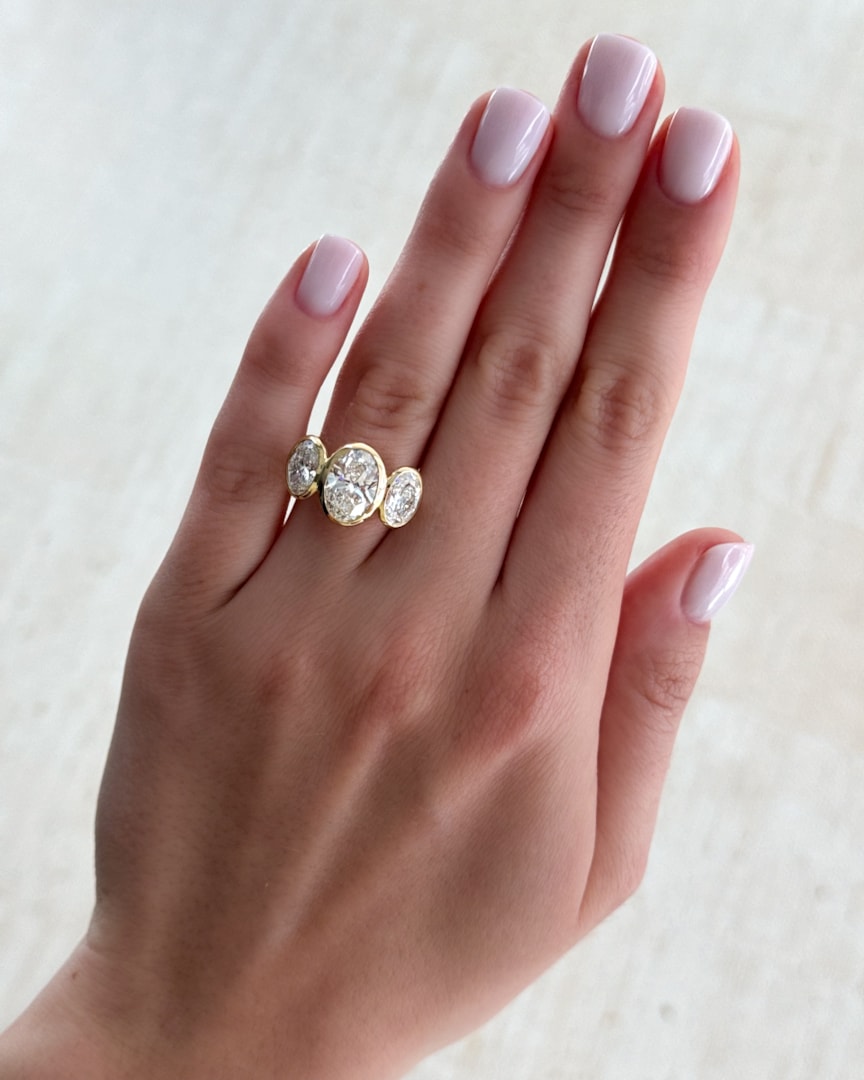
Pritoize cut with our, Penumbra Bezel Triad Engagement Ring With Oval Cut Diamonds.
The Bow-Tie Effect
Ahh, the bowtie effect. It's a hush-hush term that people are often quite afraid of, but it helps to have a good understanding of it. The bow tie effect is a phenomenon most commonly found in elongated shapes such as oval, marquise, and pear shapes. The bow tie appears as a dark bow tie-shaped section across the center of the stone as a result of how light interacts with the facets of the diamond, specifically how light enters and exits the stone. It can even happen just by your own shadow as you peer into the diamond!
In well-cut diamonds, the bow tie effect is minimized, but it can never be completely eliminated. The key to a beautiful diamond with minimal bow tie is to find one with well-proportioned facets that distribute light evenly, enhancing the overall brilliance and fire of the stone. Viewing the diamond in person, or at least seeing good quality photos and video can help you choose a diamond where this effect is minimal.
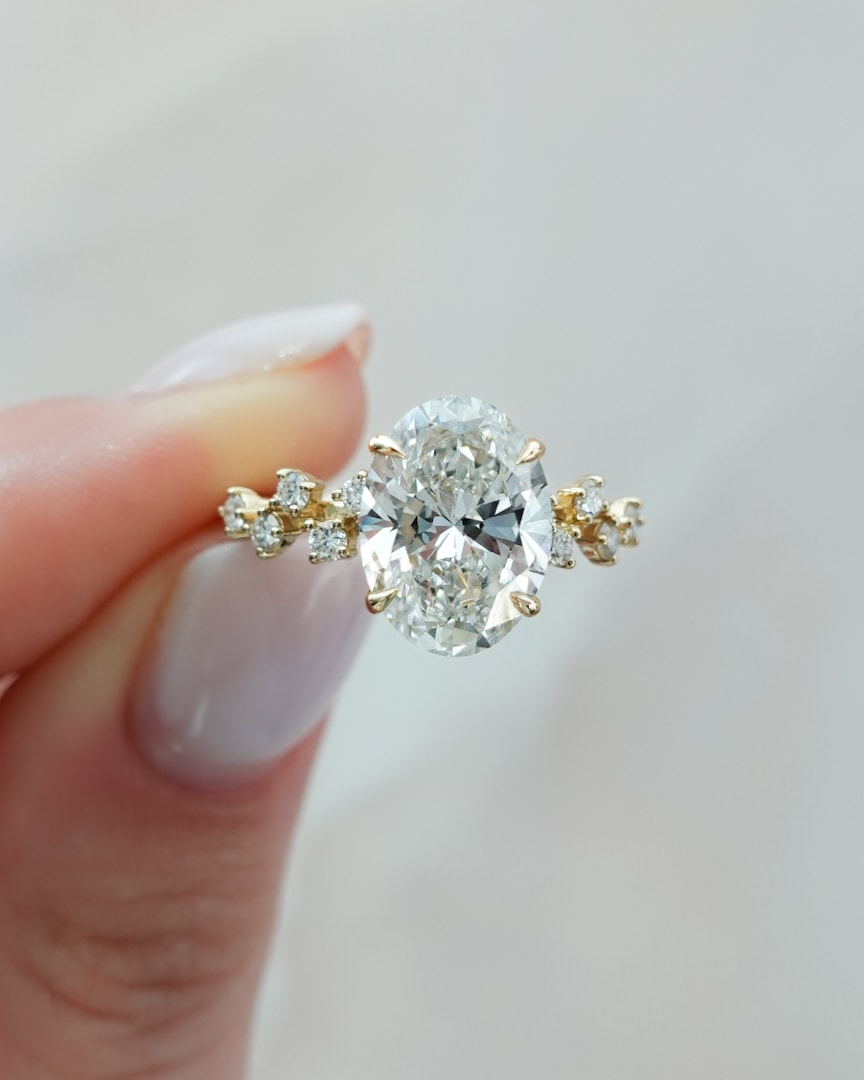
At GOODSTONE, we ensure there are no bowties in our diamonds, as seen in the Starfire Engagement Ring with Oval Cut Diamond.
What is a crushed-ice cushion cut diamond?
Cushion-cut diamonds come in two distinct styles: the standard cut and the crushed ice cut. The standard cushion cut, also known as the brilliant cushion cut, features larger facets that create broad flashes of light and well-defined reflections, giving the diamond a classic and traditional sparkle.
In contrast, the crushed ice cushion cut, sometimes called a modified cushion cut, has more smaller facets that scatter light in various directions. This creates a more dispersed and less defined sparkle, akin to the look of crushed ice. This gives you a shimmering appearance, with a less structured pattern of light and dark areas. While each has its own charm, the choice between a standard and crushed ice cushion cut ultimately depends on personal preference and the desired visual effect.
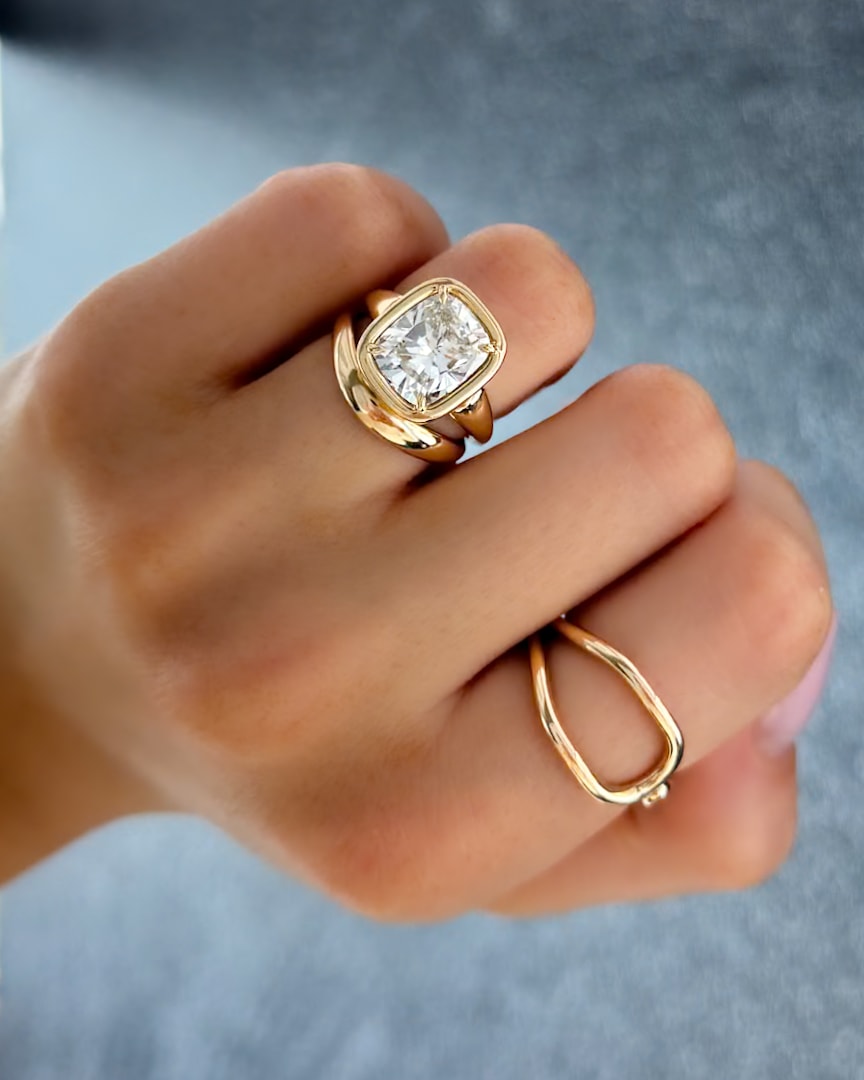
Any style of the cushion cut looks amazing in our famous Club Ring Setting.
Diamond Pricing
Okay, let’s get real about the budget. Elongated cushion-cut diamonds tend to be a bit more affordable than ovals because they’re less in demand. You might get a bigger stone for your buck here. Oval cut diamonds can be a bit pricier, especially if they’re well-cut and free of that pesky bow-tie effect. But the extra sparkle might be worth the splurge! In the bigger diamond world, however, both are on the more affordable end compared to other diamond shapes.
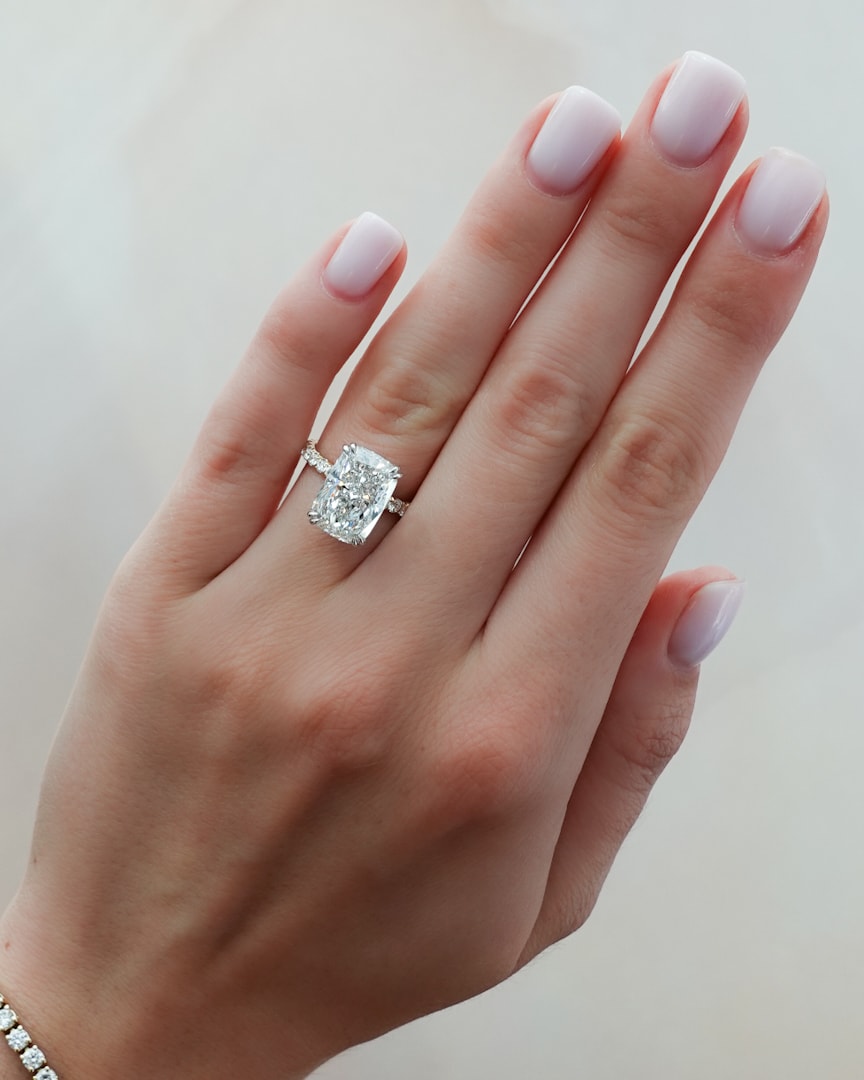
Sparkle big with the Signature Pavé Engagement Ring With Elongated Cushion Cut Diamond.
Which diamond shape are you swooning for?
So, which elongated shape should you choose? It's all about you! When choosing elongated cushions or oval cut diamonds, or any other shape for that matter, it really comes down to your personal style and what makes your heart go pitter-patter. Do you love the elegant appearance and vintage charm of elongated cushion cuts, or does the timeless sparkle and sophistication of the oval cut have you swooning?
Explore our collection of engagement ring settings to see how they look, comparing the overall style with different center diamond shapes. Whether you're after a solitaire setting or halo setting or something completely unique, we're here to help bring your personal preferences to life.








Dejar un comentario